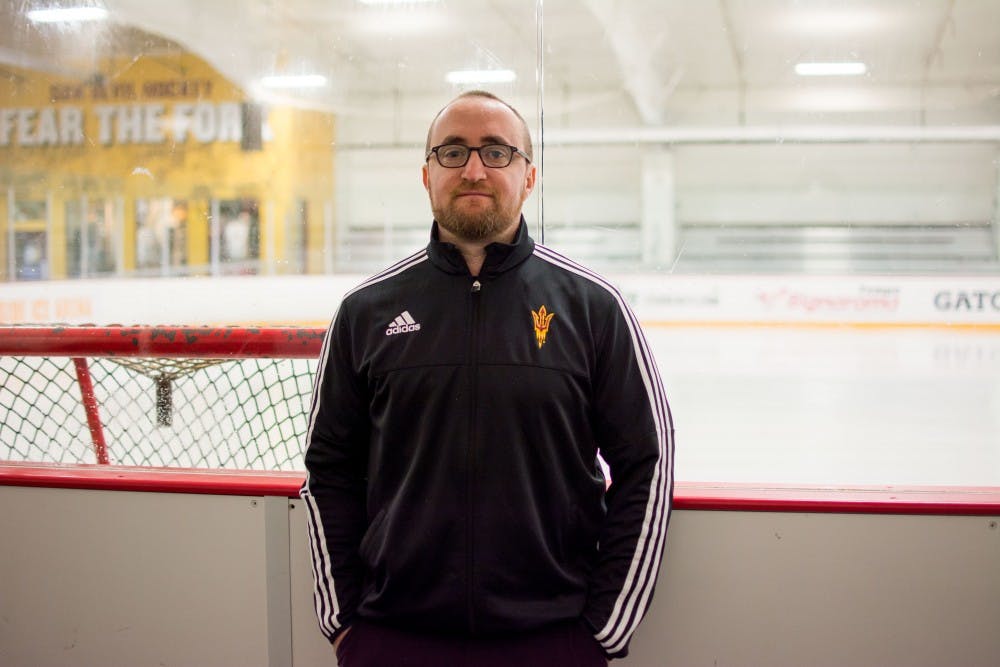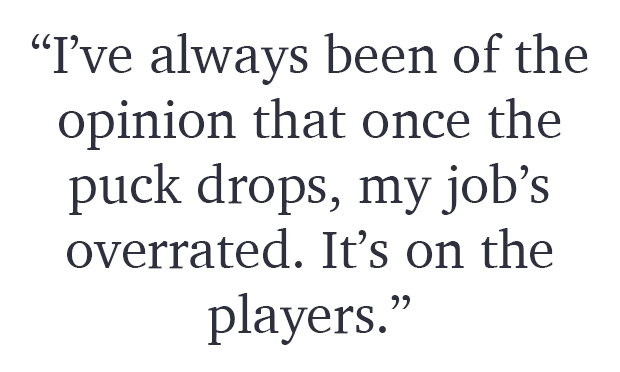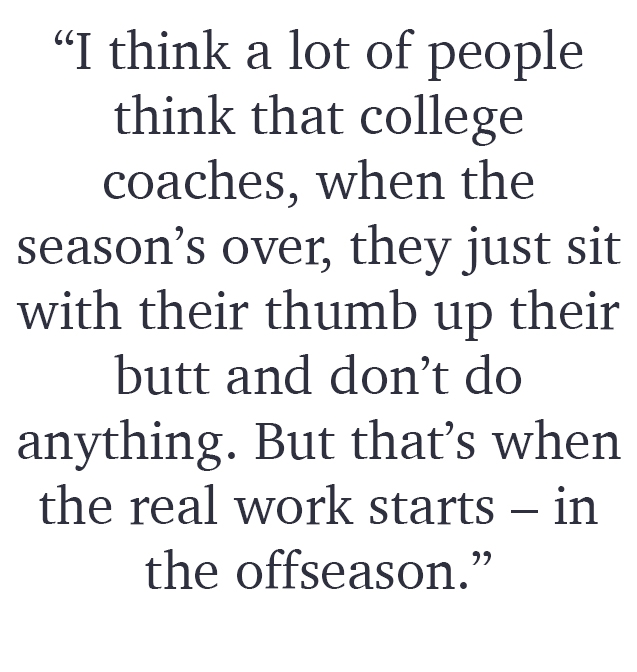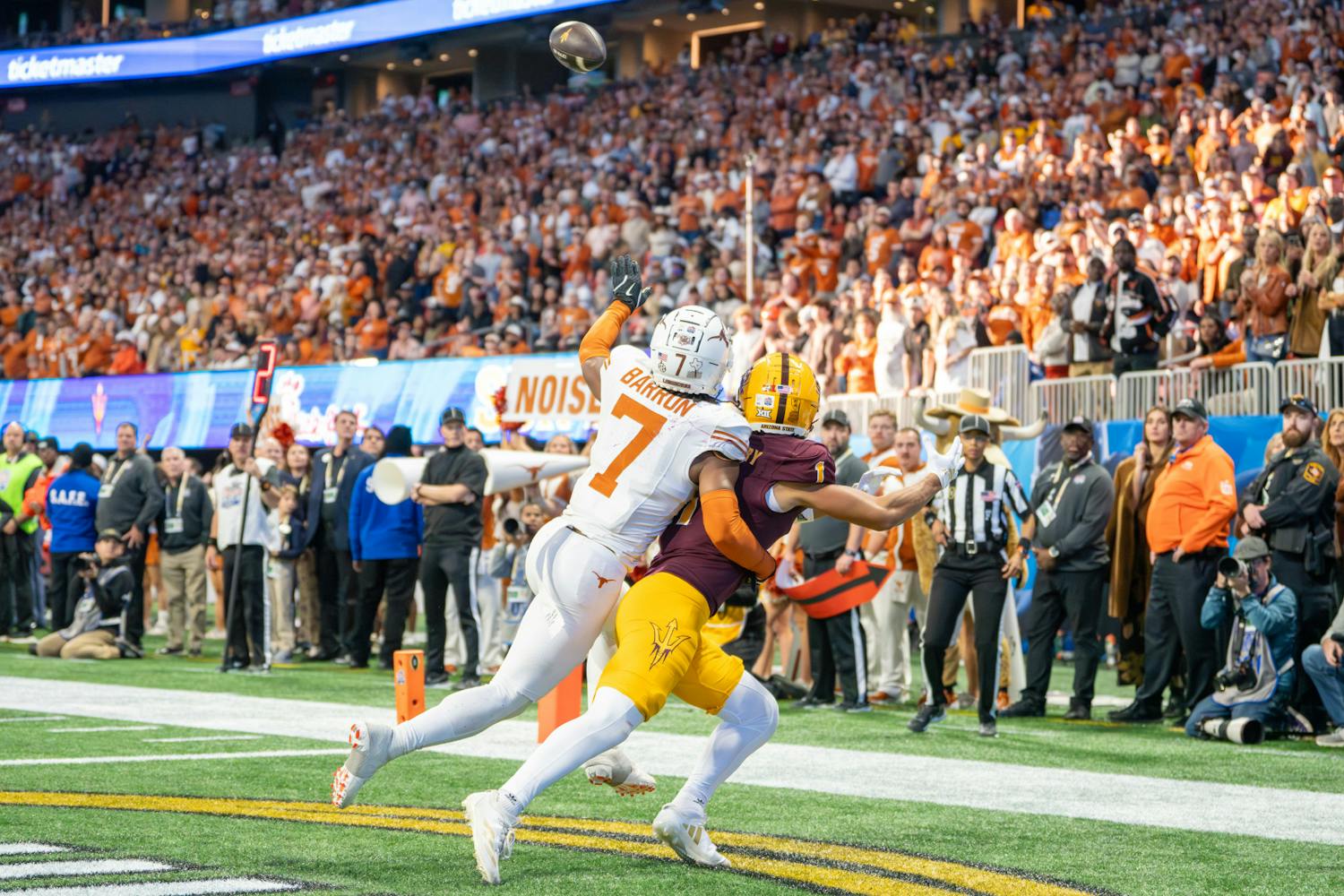On a February morning inside a chilly Oceanside Ice Arena, Greg Powers finished up practice with the Sun Devils, who are ready to embark on a road trip for its last two games of the season.
Though it was just past 10 a.m., Powers was already several hours into his day. He said he gets up at 5:30 a.m., works out, then commutes from Anthem, Arizona — an hour away. Once he gets to the arena to plan practice, his day is only beginning.
After talking with a reporter, Powers needed to coordinate with Hockey Operations Director Adam Blossey for the road trip that began the next day. Once the team played two games in Michigan that weekend, Powers stayed up north to begin his off-season recruiting.
“I think it’s a stressful job. We only see a part of it,” said senior defenseman Drew Newmeyer, who has played for Powers as the team elevated from club status to NCAA Division I. “There really are no days off. It’s not a 9-to-5. It’s a 24-7 type of thing.”
While part of Powers’ job is being a disciplinarian, he said he has an open-door policy with his players. Captain and sophomore forward Dylan Hollman spoke highly of Powers’ ability to balance discipline and relatability.
“As a head coach, he not only has to direct us on the ice but I think more of a challenge is managing the team off the ice,” Hollman said. “I’ve had coaches in the past who are not that easy to communicate with and tough to know what’s going on their mind, but I could tell right away (when I first talked to him) he’s an easy guy to talk to.”
Hollman said Powers was working to help him find an internship over the summer in his major of accounting and finance. Newmeyer said Powers is almost like a father figure.
Powers wears many hats in his professional and personal life: Coach, disciplinarian, mentor, recruiter, travel-coordinator, father and husband, among others. And on this particular Wednesday morning at the arena, the task at hand was to partake in an interview with The State Press.
What’s a game day like for you?
Powers: “Game days, at home, I wake up and try to get a workout in. Usually I work out around 6 a.m. and then drive down. I spend a lot of time in the car, get any calls I need to, especially on the East Coast, I can call out early in the morning which is good. I get here, finish planning practice if I didn’t do it the day before, get ready for practice, get everything situated, do our game day skate, and then spend the rest of the day in the office either recruiting or prepping or doing whatever administrative stuff that needs to be done, and then getting ready for our games.
“I go through a lot of thought in planning our pregame meeting, what the message needs to be, any final details that we need to cover going into whatever opponent that we’re playing. And then, really, I’ve always been of the opinion that once the puck drops, my job’s overrated. It’s on the players.
You mentioned getting up early — is this a late night, early morning job?
“It never stops. Sometimes it’s coaches that you want to talk to when you’re recruiting kids or those kids have off-hours practicing when you’re recruiting, so you have to be available at all times.
“The way I operate is I have an open-door policy with my guys, 24/7 if they need something or have a question, or if it’s something personal, they can reach out. I’m always willing to help them handle whatever I need to help them handle. So, it’s a 24/7 job. Usually I wind down by about 10 p.m. after I’ve put my kids to bed at home and spend some time with my wife. And whatever work I’ve got to get done before I go to bed I get done, I wake up at about 5:30 a.m. every day and get back at it.”
What do you do in the off-season?
“It’s all just getting ready for the next season. Trying to build off of what you established — in a good way — and continue to move in a positive direction.
“(We’re) continuing to think of ways we can continue to build our culture and do things better and reflect on the previous season, where maybe we did things we didn’t like that didn’t work. And not necessarily systematic stuff on the ice, just overall program-building type things like working out at 6:30 a.m., maybe we want to tweak stuff there; yoga every Tuesday, maybe we want to do it every other Tuesday. And that’s all just getting feedback from the players and figuring out what they liked and figuring what they thought worked well.
“This is with any sport in college — when our games end this weekend, things get crazier. Things get even more busy. If you saw my calendar through March and April, I think I’m here less than I was during the season. During the season, everything is regimented. As a head coach, you have to be local during the week with your team, running practice, overseeing your program, but when you no longer work with your players, you focus on everything else. Whether it be cultivating donor relationships and going to community events, whether it be recruiting.
“You get pulled in a lot of different directions. I think a lot of people think that college coaches, when the season’s over, they just sit with their thumb up their butt and don’t do anything. But that’s when the real work starts — in the off-season.”
You have kids and a family. Is it tough to have a personal life with this job?
“Yeah, it is. You have to have a supportive family and I certainly do. It’s good with where I live, both of my children play hockey up in Scottsdale. So, on Mondays and Tuesdays on the way home, I can always stop off in Scottsdale and spend time and watch them practice. I don’t get to see them play very many games at all. I got our weekend off last weekend. Luckily, my daughter had a tournament here locally so I got to see all of her games. So I don’t get to see them do much. I try to, during the week, always be at every practice and every activity that I can. And I have a job where whatever I need to get done I can get done, I don’t have to be in my office on campus, I can be at home, I can be in my car. Juggling personal life and being a good father and a good husband is certainly a challenge at times, but I do my best.”
Are your kids pretty good hockey players?
“Yeah! My daughter’s a 9-year-old, and she’s the only girl in the top Triple-A team in the state that plays with all boys, so she’s really good. My (7-year-old) son’s just getting started in Mini Mites, so we’ll see how he pans out but he’s having fun, that’s all that matters.”
Head coach @asucoachpowers taking ice at Lawson Arena as he did once before as a kid growing up in Indianapolis. #MemoryLane #BeattheBroncos pic.twitter.com/dMY8e2VqiP
— Sun Devil Hockey (@SunDevilHockey) February 3, 2017
How much does your corporate recruiting background affect you as a coach?
“I think it’s applicable in every way. I was hired by organizations and large corporations to go find the perfect fit for very important positions, whether it be a CEO, a CFO, a VP of sales. So what I had to do was learn their culture, learn where they wanted to go, what maybe didn’t work in the past and go find that person that fit into that vision. So the human side of what I did was very important in reading people and finding good cultural fits.
“We know what we want here. We know what kind of program we want to build here. Finding the right kids who have the right mindset, not just the best hockey players, but most importantly the kids away from the rink who want to build our culture and enhance it and enrich it and help us achieve our vision as a program.”
How do you balance being a disciplinarian and trying to be relatable and be their buddy?
“Well, certainly the one thing they know I’m not is their buddy. I’m not their friend and they know I’m not their friend. But they know I love them and I care about them. So I think that holds more water when things are good and they’re doing the right things, especially away from hockey, and they’re performing in the classroom and they’re behaving in the community, and they’re handling their business away from the rink. Everything here is great.
“When they walk in the door it’s positive, it’s supportive, we have fun together, but when they don’t — I don’t have any issues going the exact opposite way. … It holds a little more water when you’re not every day down kids’ throats and making things so hard and being negative and yelling and screaming. You’ve got to pick your spots. And when you do, it means a lot more to the players.”
You had recruits in on Monday. What’s that like when they come here?
“On Sunday, I picked up two and (assistant coach Alex) Hicks picked up two. We all went to dinner, all six of us, dropped them off at their student hosts, and then Monday morning, Hicks picked all four of them up, they came to practice, we did the whole campus tour, they met with our athletic directors, they met with our academic resources. I took one of the guys to lunch that wasn’t committed. Two of them were committed, they just were taking their official (visits).”
Related: Golf Carts and Palm Trees: How ASU Hockey recruits its players
“Then I ended up taking the other one that wasn’t committed to dinner on Monday night and they left Tuesday morning. So, it’s a really full, action-packed day where they get in, you take them to dinner, they get to know the guys a little bit, they wake up at 7:30 a.m. on Monday, go to about 7 p.m., so it’s about a 12-hour action-packed day of information that we try to get all the kids who come in here to see what we’re all about, and then we get them back on a plane and send them back to their team.”
What’s your view on reporters, especially at a college where so many reporters are students? Does it ever get tedious dealing with the media?
“No. It’s all part of it. As long as I’m here, we’re never going to forget where we came from. I think a lot of our success as a club program is the fact that the student media took so well to us and covered us and gave us the coverage that put us out there and into the community and to the right people on campus.
“I tell Mitch (Terrell, of Sun Devil media relations) every day, and it will always be this way, if a student reporter — whether it be a kid doing a project in his class, whether it be a State Press guy like yourself, whether it be somebody from Cronkite — anybody, if they want to talk to me and they want to get time with me, I’ll always set time aside to do it. We’ll never get too big for that, we’ll never forget where we came from, and it will always be that way. That side of the media thing to me is really important to continue to foster and support. I’ve seen so many kids go through this process with me and then they graduate, and now they’re having a ton of success doing whatever it is that they’re doing, doing what they love doing.”
What did you plan to do with your broadcast journalism degree?
“I don’t know. I was the sports director for my high school radio station, so I did play-by-play for football when I didn’t play hockey. So I did about half of those. And then I tried to do all the play-by-play for basketball. I love sports. I love football, I love basketball, I probably watch more football and basketball than I do hockey, to be honest. That’s what I envisioned myself doing. And then I got to school and, I don’t know. I had an itch to get into business, even though I didn’t major in business, and that’s what I did.
“Really, the first time I ever used my degree in broadcast was just the other night when I was a guest analyst at the (Arizona) Coyotes. But who knows. Maybe when I’m done coaching, I’ll mix the two and get into it. I think at the end of the day, a lot of kids major in things that maybe they don’t apply to where they go in the real world, and I think the most important thing in college is if you start something, you finish it, and that’s what that degree means. You’re committed to getting it and earning it and finishing it.
"As everyone is seeing tonight, I have a face for radio." -@asucoachpowers on why coaching overtook his broadcast degree. pic.twitter.com/GwoLudw3BN
— Sun Devil Hockey (@SunDevilHockey) February 10, 2017
Do you ever have players ask you about becoming a coach?
“Yeah, it happens all the time. I think everybody has a different path to their ultimate destination in any profession, and I tell them there’s not one right way to become a coach.
“I think if I could go back in time — because I love what I do so much now — and start coaching earlier in my life, I probably would have. It ended up working out for me, but it’s my advice to kids that if they think they want to get into coaching, go right into it, try it before they have to put food on the table for a family, just worry about themselves. And that applies to anything. Whatever you think your passion is, you should try and tackle it right away. Whether it’s journalism, whether it’s — it doesn’t matter. When you only have yourself to worry about and support, before you start to build and grow a family, go do what you love. And if you can figure out how to do what you love really well, you’re going to end up making a living at it.”
How fun is being an NCAA hockey coach?
"It’s a lot of fun. Everyone always asked — they still ask — ‘How are you liking it?’ My answer still is, ‘It beats working.’ It’s a lot of work — I don’t want to call it work, but it’s a huge commitment. This program needed, because of where we are in our infant stages, a group of people that didn’t look at the clock and would work 24/7 and knew they would never be off the clock. In hiring our staff, that’s the kind of characteristic that I most look for. So, it’s a ton of work but it’s a ton of fun and we’re having a blast.”
Reach the reporter at matthew.layman@asu.edu or follow @Mattjlayman on Twitter.
Like State Press Sports on Facebook and follow @statepresssport on Twitter.






